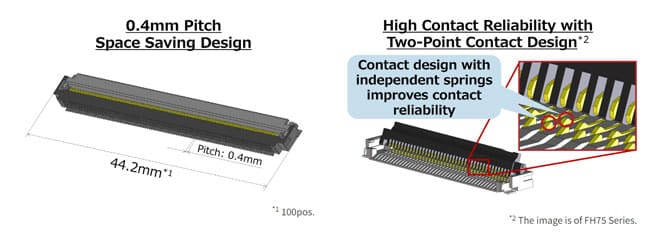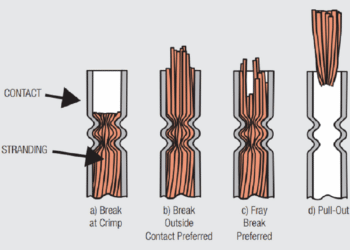Hirose Electric is pleased to announce the addition of a new 0.4mm pitch variation, the FH75M Series, to the existing FH75 Series, which consists of 0.5mm pitch, two-point contact, and 125℃ heat resistant automotive FPC/FFC board to board connectors.
New Product for Enhanced Space-saving and Functionality of Automotive Applications
Resulting from the spread of automated driving in recent years, automotive interior space is growing in importance and displays have become increasingly larger and higher definition. Consequently, compact, high pin count connectors that can support an increased number of signals are required to support these industry trends.
To meet this need, Hirose developed and released the 0.5mm pitch, 125°C heat resistant automotive FPC/FFC connector, the FH75 Series, in 2020. Since then, the FH75 Series has been adopted by many customers, mainly for automotive displays.
Hirose is expanding the FH75 Series product line up with the release of a new, 0.4mm pitch variation, the FH75M Series. FH75M maintains the features of the FH75 Series, such as the 125°C heat resistance and two-point contact design for high contact reliability, with a contact pitch reduced by 0.1mm for even greater space reduction. Furthermore, while development of pin count variations for the FH75 Series is planned up to 80pos., FH75M is available in 100pos., with plans to expand to 120pos.
FH75M Series: 0.4mm Pitch, High Pin Count, Two-Point Contact, 125℃ Heat Resistant FPC/FFC Connector
(1) Compact design with 0.4mm pitch and a high pin count (80, 100, 120 pos.)
(2) Independent two-point spring contact design reduces contact failure due to dust intrusion.
(3) 125ºC heat resistance to satisfy severe automotive requirements

Future Product Development
The newly developed FH75M Series was released with 100pos. in April 2024. Development of the below pin count variations is planned in order to meet diversifying internal automotive interconnect needs.
– Under Planning: 80 and 120pos.
The reliable design satisfies in-vehicle quality requirements and can also be used for industrial equipment exposed to harsh environments.






